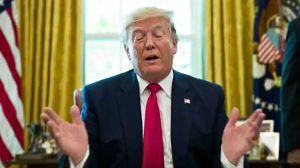Lapse of FCRA Ordinance boosts dabba trading in commodities
Even as the government awaits the Abhijit Sen committee report on the impact of futures market on price rise...

Even as the government awaits the Abhijit Sen committee report on the impact of futures market on price rise, the lapse of the Forward Contract (Regulation) Amendment Ordinance has given a boost to dabba traders in commodities.
The Ordinance — which empowered the regulator, Forwards Market Commission, to move swiftly and forcefully against fraudulent trade practices — received the President’s nod in February this year. But six weeks have already gone by since the Parliament session began, and the government could hardly muster courage to get the Bill passed, especially in the backdrop of large protests against rising inflation.
Bharat Tripathi, director of the Forward Markets Commission (FMC), told The Indian Express that once the Ordinance came into effect, the regulator took action against many dabba traders. Market players said there were raids on as many as 20-25 such traders in March alone across the country, from Delhi to Indore, Kolkata and Hyderabad. Tripathi said though it was difficult to quantify the violation, information collected during the raids was still being analysed.
Dabba trading, which is illegal in India, is unofficial trading where people do not have to maintain any margins for trading in commodity futures and also do not have to pay any transaction fees and taxes. A dabba trader usually takes the reference price from one of the recognised electronic exchanges, and lets clients trade in “kachcha chitti”. If the trader defaults, the clients do not have any recourse and often end up as informants to the FMC against him.
“The volumes traded in the dabba market are very significant. In terms of value, it is mind-boggling. But we cannot say how big this is,” said Tripathi, an Indian Revenue Service officer who is on deputation with the FMC and is spearheading the raids.
When contacted, FMC chairman B C Khatua said, “The Bill had already been introduced in Parliament. But since it could not be enacted in six weeks, we are back to square one. Whatever problems FMC faced earlier, it will continue to face now.”
The Ordinance empowered FMC to levy penalties on fraudulent and unfair trade practices of up to Rs 25 lakh or three times the amount of profits made out of such practices, whichever is higher.
The biggest hurdle today, according to Tripathi, is FMC’s inability to maintain secrecy and move swiftly when it receives information about illegal trading. “The Ordinance allowed FMC powers to investigate, attach books and even penalise wrong-doers. But now, we have to first approach the police and the courts,” he said. This results in delays, alerts the fraudulent operator, and gives him enough time to mask his illegal activities.
Trading in dabbas
Dabba trading, which is illegal in India, is unofficial trading where people do not have to maintain any margins for trading in commodity futures and also do not have to pay any transaction fees and taxes. A dabba trader usually takes the reference price from one of the recognised electronic exchanges, and lets clients trade in “kachcha chitti”. If the trader defaults, the clients do not have any recourse and often end up as informants to the FMC against him.
Photos




- 01
- 02
- 03
- 04
- 05



























